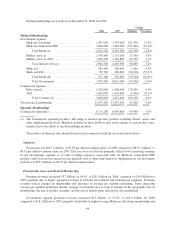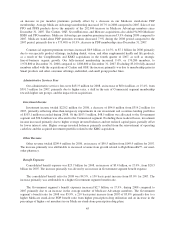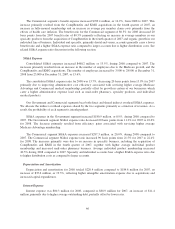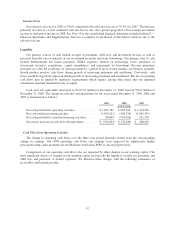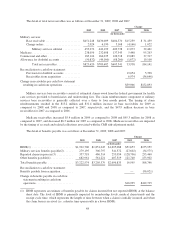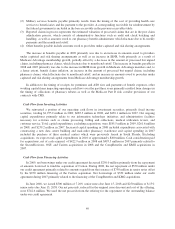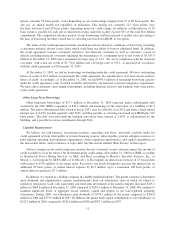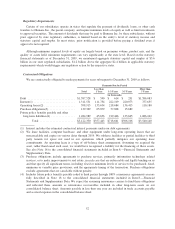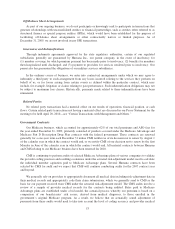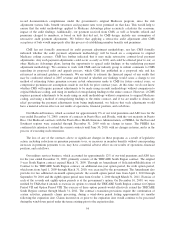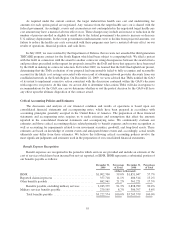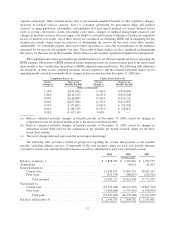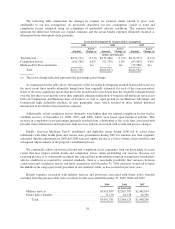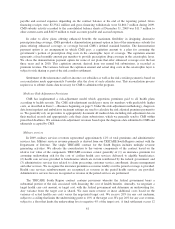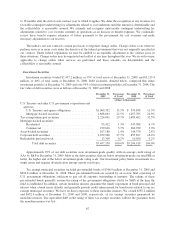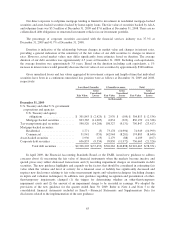Humana 2009 Annual Report Download - page 64
Download and view the complete annual report
Please find page 64 of the 2009 Humana annual report below. You can navigate through the pages in the report by either clicking on the pages listed below, or by using the keyword search tool below to find specific information within the annual report.record documentation completeness under the government’s original Medicare program, since the risk
adjustment system, bids, benefit structures and payment rates were premised on that data. This would help to
ensure that the audit methodology applied to Medicare Advantage plans accurately calculates the economic
impact of the audit findings. Additionally, our payment received from CMS, as well as benefits offered and
premiums charged to members, is based on bids that did not, by CMS design, include any assumption of
retroactive audit payment adjustments. We believe that applying a retroactive audit adjustment after CMS
acceptance of bids would improperly alter this process of establishing member benefits and premiums.
CMS has not formally announced its audit payment adjustment methodology, nor has CMS formally
indicated whether the audit payment adjustment methodology will be based on a comparison to original
Medicare coding accuracy. CMS has further indicated that it may make retroactive contract-level payment
adjustments. Any such payment adjustments could occur as early as 2010, and could be effected prior to our, or
other Medicare Advantage plans, having the opportunity to appeal audit findings or the underlying payment
adjustment methodology. We continue to work with CMS and our industry group to submit comments to CMS
regarding its proposed audit and appeals process, which CMS has published in a proposed rule and has
referenced in informal guidance documents. We are unable to estimate the financial impact of any audits that
may be conducted related to 2007 revenue and beyond or whether any findings would cause a change to our
method of estimating future premium revenue in bid submissions made to CMS for future contract years, or
compromise premium rate assumptions made in our bids for prior contract years. At this time, we do not know
whether CMS will require payment adjustments to be made using an audit methodology without comparison to
original Medicare coding, and using its method of extrapolating findings to the entire contract. However, if CMS
requires payment adjustments to be made using an audit methodology without comparison to original Medicare
coding, and using a method of extrapolating findings to the entire contract, and if we are unable to obtain any
relief preventing the payment adjustments from being implemented, we believe that such adjustments would
have a material adverse effect on our results of operations, financial position, and cash flows.
Our Medicaid business, which accounted for approximately 2% of our total premiums and ASO fees for the
year ended December 31, 2009, consists of contracts in Puerto Rico and Florida, with the vast majority in Puerto
Rico. Our Medicaid contracts with the Puerto Rico Health Insurance Administration, or PRHIA, for the East and
Southeast regions were extended through December 31, 2009 with no change in terms. The PRHIA has
confirmed its intention to extend the current contracts until June 30, 2010, with no changes in terms, and is in the
process of executing such extensions.
The loss of any of the contracts above or significant changes in these programs as a result of legislative
action, including reductions in premium payments to us, or increases in member benefits without corresponding
increases in premium payments to us, may have a material adverse effect on our results of operations, financial
position, and cash flows.
Our military services business, which accounted for approximately 12% of our total premiums and ASO fees
for the year ended December 31, 2009, primarily consists of the TRICARE South Region contract. The original
5-year South Region contract expired March 31, 2009. Through an Amendment of Solicitation/Modification of
Contract to the TRICARE South Region contract, an additional one-year option period, the sixth option period,
which runs from April 1, 2009 through March 31, 2010, was exercised by the government. The Amendment also
provides for two additional six-month option periods: the seventh option period runs from April 1, 2010 through
September 30, 2010 and the eighth option period runs from October 1, 2010 through March 31, 2011. Exercise of
each of the seventh and eighth option periods is at the government’s option. On December 16, 2009, we were
notified by TMA that it intends to exercise its options to extend the TRICARE South Region contract for Option
Period VII and Option Period VIII. The exercise of these option periods would effectively extend the TRICARE
South Region contract through March 31, 2011. The contract’s transition provisions require the continuation of
certain activities, primarily claims processing, during a wind-down period lasting approximately six months
following the expiration date. Claims incurred on or prior to the expiration date would continue to be processed
during the wind-down period under the terms existing prior to the expiration date.
54


